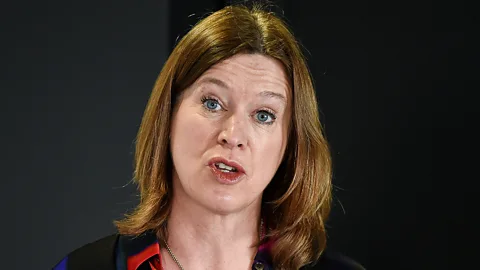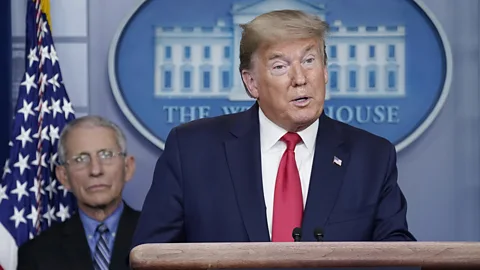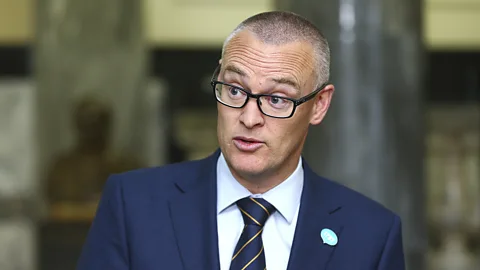The subtle reasons why leaders ignore their own advice
 Getty Images
Getty ImagesEverybody hates a double standard. But leaders who don’t follow their own rules may be doing so for reasons that make perfect sense to them.
In order to minimise the suffering caused by Covid-19, global leaders are asking everyone to make sacrifices. People around the world are giving up, for a period, many of the things they love doing: visiting friends and family, travelling, shopping, congregating with others. It’s hard to do, but since governments are advising that this is the only responsible path to take, most people are taking it.
If there is one group of people whom you would expect to follow these new rules stringently, it would be the people issuing them. Politicians and government officials are more intently aware of the gravity of this situation than anyone, and have the added responsibility of setting an example for the rest of us. Why is it, then, that so many of them fail to take their own advice?
Scotland’s chief medical officer, Dr Catherine Calderwood, was forced to resign after the press discovered that during lockdown she had made two separate trips to her second home, an hour’s drive from her family home in Edinburgh. In New Zealand, the health minister Dr David Clark was demoted after he broke national lockdown rules in order to take his family to the beach. In South Africa, a minister was suspended after being photographed having lunch with her friend.
This is not a phenomenon limited to the current crisis, of course, or to governments. In 2019, the chief executive of McDonald’s, Steve Easterbrook, was fired after it was disclosed that he was romantically involved with an employee. While there was no indication that the relationship was anything but consensual, the relationship clearly violated the company’s strict guidelines on workplace affairs – guidelines for which Easterbrook was ultimately responsible.
A leader’s authority depends on people perceiving them as a person of integrity; by acting in a hypocritical manner, leaders undermine their own positions. And most leaders like to be liked, yet people are angered by double standards. Why, then, is this behaviour so common – and what’s behind it?
 Getty Images
Getty ImagesPleasing different stakeholders
Daniel Effron, a social psychologist and associate professor at London Business School, studies hypocritical behaviour. “People can be inconsistent without getting called hypocritical,” he says. “If a drug addict tells people not to start taking drugs, few people would condemn them for it. But if someone is preaching virtue in public while practising vice in private, people get angry because they think that person is claiming a moral benefit – of appearing like a good person – which they don’t deserve.” It’s unfairness, not inconsistency, that really gets to us.
If leaders know that hypocrisy goes down badly, why do they give people reason to accuse them of it? The simplest explanation is that they think they can get away with it. But although that may be true in some cases, Effron points out that most people like to see themselves as virtuous. A subtler reason is that they end up practising one thing and preaching another in a bid to please different audiences.
“In all sorts of organisations, people get caught between the conflicting demands of different stakeholders,” says Effron. “One constituency wants X, the other wants not-X, and the leader tries to satisfy both: one with talk, the other with action, even though the talk and the action contradict each other.”
You might think that in a crisis like this one, national leaders have only one audience to serve – the public. But try and see it from their perspective, says Effron. “Sometimes, one of those stakeholders will be their family. They may see themselves as balancing their family’s needs against their duties to the public.” To an individual trying to satisfy multiple stakeholders, it does not necessarily feel like they’re doing the right thing in public and the wrong thing in private. It may feel like they’re trying to do the right thing in two different contexts.
Effron has researched how people from different parts of the world think about inconsistent behaviour. He found that in cultures that emphasise the needs of the group or community over the individual, as can be found in some Asian and Latin American countries, inconsistent behaviour is not as readily associated with hypocrisy as it is in the more individualistic cultures of the UK and US. In collectivistic cultures, it is accepted that people have multiple constituencies to serve and will prioritise the preservation of relationships – even when that means saying one thing and doing another.
 Getty Images
Getty ImagesStockpiling virtue
There is another reason that leaders might behave hypocritically, particularly when they’re under pressure.
It relates to a phenomenon that psychologists call ‘moral licensing’. In 2008, the year that Barack Obama became the first African-American elected president of the United States, Effron and his colleagues recruited a group of white Obama supporters for an experiment. All of the participants were asked to say whether or not a particular job was more suited to a black or a white person. Half the group were asked a preliminary question, on whether or not they were Obama supporters (the participants didn’t know that the person asking the questions was already aware of their support for Obama). The people who answered this additional question were more willing to describe the job as better suited to whites than blacks. In other words, they were not as concerned with appearing prejudiced, because expressing support for Obama had made them feel secure about their own anti-racist credentials.
Psychologists have identified moral licensing at work in all sorts of contexts. For instance, recalling a recent example of their own ethical behaviour can reduce people’s intentions to donate, give blood and volunteer. Purchasing an environmentally friendly product can make people more likely to cheat and steal. Doing or saying something virtuous seems to make people feel licensed to act in ways that might otherwise call their virtue into question.
 Getty Images
Getty ImagesLeaders, particularly during a crisis like the current one, are often working extremely hard for what they perceive to be the common good. They might be striving to keep people healthy in a pandemic or securing the future of their organisation. Psychologically, they are amassing moral credits in the bank. That makes them likely to judge their own behaviour more kindly than they would do otherwise, even when it verges on the unethical.
“We can always think of explanations for why ‘I should be an exception’,” Effron says. “And we’re really good at convincing ourselves that those reasons are right.”
Not only that, but people also convince themselves that others will see their behaviour in the same light they do. In another of Effron’s experiments, people were asked to video record themselves discussing the importance of a value, like environmentalism. Then they were asked to write down a time when they didn’t take their own counsel. Before their confessions were shown to others, they under-estimated the amount of condemnation they were about to receive for their inconsistency.
This may sound naïve, but we all have trouble understanding what is in the minds of others. Leaders who don’t follow rules they themselves have set down may be doing so for reasons that make perfect sense to them.
